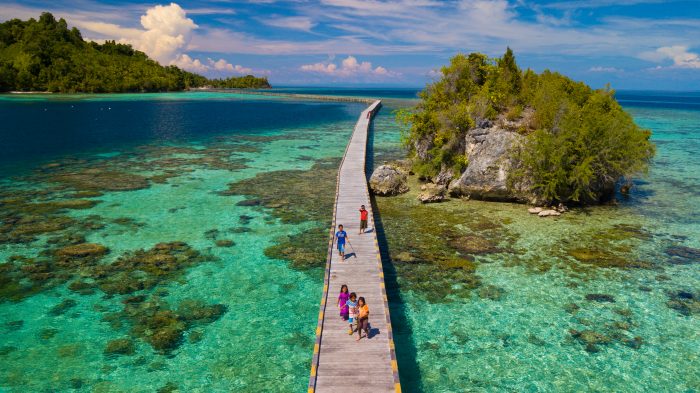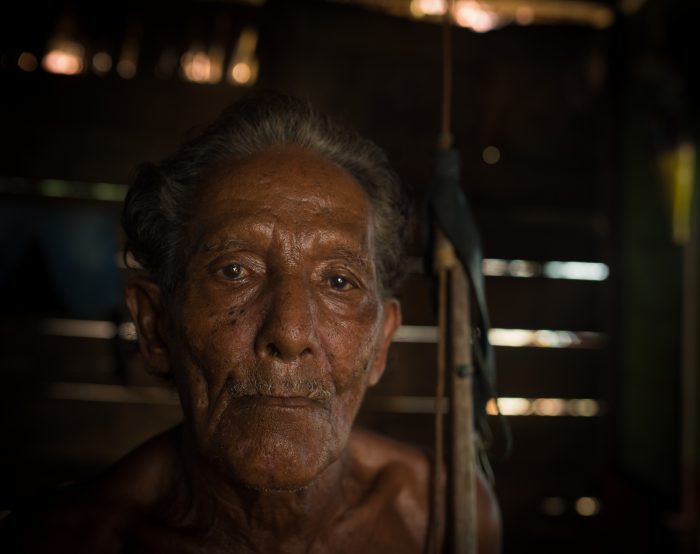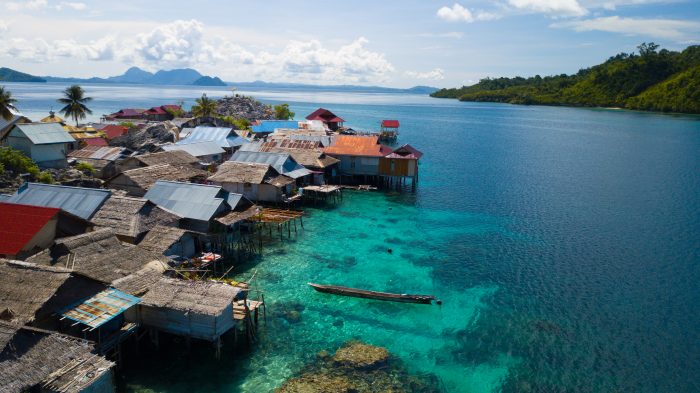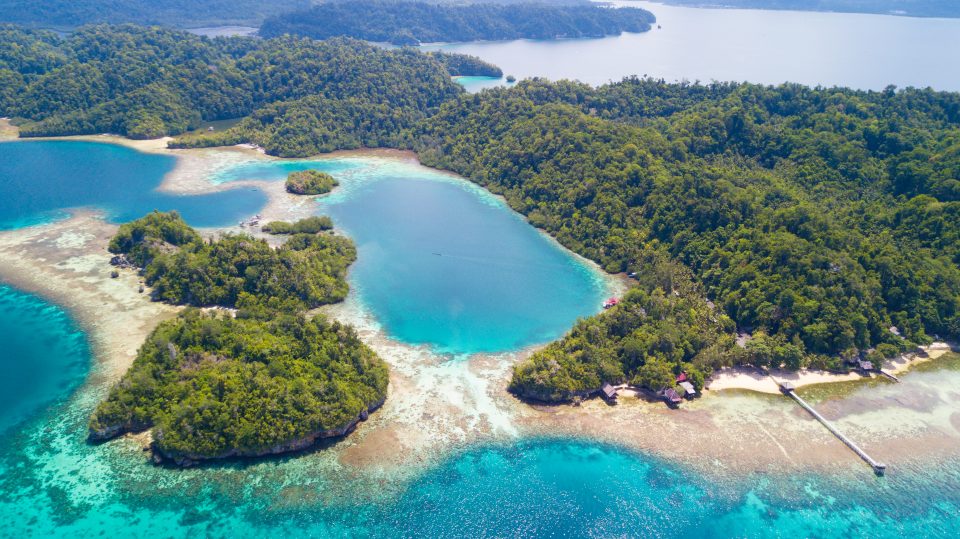The Togean Islands form an archipelago of 56 islands strung across the Gulf of Tomini in Central Sulawesi.
This string of beautiful islands has perfect, white, sandy beaches and cottage style wooden bungalow accommodation. In the Togeans you feel a million miles away from other tourists.
Indonesia is full of secret spots, and indeed, this is one of those places; totally off the tourist radar. With clear blue waters, exquisite reef diving and snorkelling, sea kayaking on offer, along with hanging out in the rainforest, what could be better? There are no five-star resorts, just little humble bungalows and a low-key vibe.
My first three days on the islands were spent discovering all the popular snorkelling and diving spots and relaxing completely into island time. Soon enough, my restless travel spirit called me. I went in search of the sea gypsies who hail from this area.

After a little investigation, I headed to Kabalutan village on one of the outer islands, and found myself sitting on the porch of Rohani, a wise and proud Bajau man. He was very happy to tell me about his life on the sea, which involved hunting for fish with just a spear gun and a pair of hand-fashioned wooden goggles. He’s in his 80’s now, but Rohani told me that in his active fishing days he moved from island to island in pursuit of fish.
I had heard that the Bajau people have a genetically larger lung capacity than average and that some can even spend up to five minutes underwater on just one breath. Rohani confirmed that this was true.

“I was born on a boat near an island, located somewhere near Makassar,” Rohani told me. “Now, Kabalutan is my home. My life as a sea gypsy has been a good one. In my younger days, I joined a Japanese fishing boat and travelled great distances. I have always had an adventurous spirit.”
At home in the Togean islands, Rohani told me his favourite place to hunt was Pulau Unauna. “It takes 12 hours to sail to Unauna from this village. It is the best reef in the Togeans. I never used an engine. It was not necessary. I’d just raise my small sail and head off.”
Now a widower, Rohani explained, “At times I had to be away from my wife and family for long periods, but I always returned and was always able to provide for my family.” He went on, “Now I am too old to hunt. My muscles have weakened, so I just sit here on the porch. I enjoy having more time to spend with my family and people like you, who come to visit me.”
Rohani, still with a twinkle in his eye, proudly told me, “I was eight years old when I did my first dive. I could hold my breath the longest. I would have competitions with my friends. No one taught me. I knew from a very young age – you must go down, down, down, very slowly. You must be careful.”
Rohani said that every boy in the village owns a spear gun and that girls can spearfish too. “When you get skilled, it usually takes around eight minutes to spear a 10kg trevally, from the pursuit to the kill.”
Rohani turned out to be quite a character, having starred in a documentary film called Jago – A Life Underwater and since the documentary came out in 2015 many visitors have arrived at his little village. “Last week we had a group of Koreans here. They all want to come and meet me,” he said, smiling.

Most Bajau people have settled in villages that sit above the sea on stilts. There are more than 37 such villages and smaller settlements in the archipelago. Other major ethnic groups include the Pamona people on the two largest islands, Togean and Batudaka, and the Saluan people.
As you cruise among the islands, you see many clusters of stilted houses which connect to each other by a long footbridge. The Bajau language is widely spoken. The main religion is Islam, which came to this part of Sulawesi in the 17th century from Gorontalo, an area north of the Togeans.
The waters of the Togean islands are plied by many tiny wooden boats, some supported with spider-like outriggers; many with single, triangle sails. The fishermen work in the gulf but often venture far out to sea. The Gulf of Tomini is protected from harsh weather conditions making for great, year-round snorkelling and diving. The only things to disturb the calm are the flying fish, which regularly jump through the air, and dolphins, which can frequently be seen breaking the surface.
The Togeans offer some of the brightest, most transparent waters in all Indonesia; viewed from above, the colours of the water are extraordinary. As well as the sea life, it is a naturalist’s delight, with forest-clad islands which provide habitat for babirusa, tarsiers, Togean macaques, and hanging parrots. Jungle trekking is very popular.
In the early morning, you can hear the call of the Togean hawk-owl. It is common to see flocks of 20 to 30 knobbed hornbills descending on the mangroves to feed. But it was the Bajau people, with their strong culture and peaceful way of life, that tugged at my Togean heartstrings. I loved getting to know a little more of their seafaring life: a life which has a place under the sea as much as on top of it. The beauty and purity of this remote location in Sulawesi will no doubt bring me back to this little piece of paradise time and time again.
FAST FACTS
ACCOMMODATION
Ten of the Togean Islands offer accommodation in mostly three-star resorts that include three meals a day. If you are a snorkeller, choose a resort which has a coral house reef at the front. Many islands have their own water supply and are run by solar energy. WiFi access does not exist, and phone reception is unreliable. You are best to book one week in advance.
STAY
Kadidiri Paradise Resort has a white sandy beach to the front. The first hotel in the Togeans, serving guests for more than 20 years. At the time of writing this article, this resort was the only one that had WiFi signal. (kadidiriparadise.com)
Black Marlin Dive Resort has an excellent house reef with budget style dormitories to private villa style. WiFi is available some 30 metres off shore in the ocean (it’s possible to go out in a boat if you need WiFi). (blackmarlindiving.com)
FLY/BOAT
Daily flights from major cities to Ampana via Makassar, Sulawesi. Transfer by boat at Ampana to your resort stay.
NETFLIX
Jago – A Life Underwater – 45 mins (www.netflix.com/bd/title/80194126)
YOUTUBE
Jago – A Life Underwater – 1.12 min documentary (www.youtube.com/watch?v=pEuh4-s7TjU)
Photos: David Metcalf




